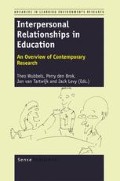Abstract
The school effectiveness and school climate research solidly identifies the variables associated with successful schools; shared values and norms, openness of governance, and trusting relationships produce committed and contented school community members (Bryk, Sebring, Allensworth, Luppescu, & Easton, 2010).
Access this chapter
Tax calculation will be finalised at checkout
Purchases are for personal use only
Preview
Unable to display preview. Download preview PDF.
References
Barnes G, Crowe E, Schaefer B. The cost of teacher turnover in five school districts: A pilot study. National Commission on Teaching and America's. Washington: Future; 2007.
Bidwell CE, Yasumoto JY. The collegial focus: Teaching fields, collegial relationships, and instructional practice in American high schools. Sociology of Education. 1999;72:234–256.
Bollen KA. Structural Equations with Latent Variables. New York: Wiley-Interscience; 1989.
Brief AP, Weiss HM. Organizational behavior: Affect in the workplace. Annual Review of Psychology. 2002;53:279–307.
Bryk, A. S. & Driscoll M. (1988). The high school as community: Contextual influences and consequences for students and teachers. National Center on Effective Secondary Schools, Madison: University of Wisconsin.
Bryk AS, Lee VE, Holland PB. Catholic schools and the common good. Cambridge: Harvard University Press; 1993.
Bryk AS, Schneider BL. Trust in schools: A core resource for improvement. New York: Russell Sage Foundation; 2002.
Bryk, A. S., Sebring, P. B., Allensworth, E., Luppescu, S., & Easton, J. Q. (2010). Organizing schools for improvement: Lessons from Chicago. Chicago The University of Chicago Press.
Creemers BPM, Kyriakides L. The dynamics of educational effectiveness: A contribution to policy, practice and theory in contemporary schools. London/New York: Routledge; 2008.
Fazio, R. H. (1986). How do attitudes guide behavior?. In R. M. Sorrentino & E. T. Higgins (Eds.), Motivation & cognition: Foundations of social behavior. New York: The Guilford Press.
Firestone WA, Pennell JR. Teacher commitment, working-conditions, and differential incentive policies. Review of Educational Research. 1993;63:489–525.
Firestone WA, Wilson BL. Using bureaucratic and cultural linkages to improve instruction - The principals contribution. Educational Administration Quarterly. 1985;21:7–30.
Hallinger P, Heck RH. Exploring the principal's contribution to school effectiveness: 1980-1995. School Effectiveness and School Improvement. 1998;9(2):157–150.
Hewitt JP. Self and society: A symbolic interactionalist social psychology. 10th ed. Boston, MA: Allyn & Bacon; 2007.
Holland JL. A theory of vocational choice. Journal of Counseling Psychology. 1959;6:35–45.
Hoy WK, Henderson JE. Principal authenticity, school climate, and pupil-control orientation. Alberta Journal of Educational Research. 1983;29:123–130.
Hulpia H, Devos G, Rosseel Y. The relationship between the perception of distributed leadership in secondary schools and teachers' and teacher leaders' job satisfaction and organizational commitment. School Effectiveness and School Improvement. 2009;20:291–317.
Kardos SM, Johnson SM. On their own and presumed expert: New teachers' experiences with their colleagues. Teachers College Record. 2009;109(102).
Kyriakides LB, Creemers PM, Antoniou P, Demetriou D. A synthesis of studies searching for the school factors: Implications for theory and research. British Educational Research Journal. 2010;36(5):807–830.
Lawler EJ, Thye SR, Yoon J. Emotion and group cohesion in productive exchange. American Journal Of Sociology. 2000;106:616–657.
Lawler EJ, Thye SR, Yoon J. Commitment in structurally enabled and induced exchange relations. Social Psychology Quarterly. 2006;69:183–200.
Lawler EJ, Yoon J. Power and the emergence of commitment behavior in negotiated exchange. American Sociological Review. 1993;58:465–481.
Lawler EJ, Yoon J. Commitment in exchange relations: Test of a theory of relational cohesion. American Sociological Review. 1996;61:89–108.
Lawler EJ, Yoon J. Network structure and emotion in exchange relations. American Sociological Review. 1998;63:871–894.
Lease SH. Annual review, 1993-1997: Work attitudes and outcomes. Journal of Vocational Behavior. 1998;53:154–183.
Lee VE, Bryk AS. A multilevel model of the social distribution of high-school achievement. Sociology Of Education. 1989;62:172–192.
Leithwood, K. & Jantzi, D. (1990). Transformational leadership: How principals can help reform school cultures. Paper presented at the Annual Meeting of the Canadian Association for Curriculum Studies, Victoria. June, 1990.
Leithwood, K. & Jantzi, D. (2008). Linking leadership to student learning: The contributions of leader efficacy. Educational Administration Quarterly, 44, 496-528.
Meyer JW, Rowan B. Institutionalized organizations - Formal-structure as myth and ceremony. American Journal of Sociology. 1977;83:340–363.
Miskel C, Ogawa R. Work motivation, job satisfaction, and climate. In: Boyan N, editor. Handbook of educational administration. New York: Longman; 1988. p. 279–303.
Ogawa RT, Bossert ST. Leadership as an organizational quality. Educational Administration Quarterly. 1995;31:224–43.
Price HE. Principal-teacher interactions: How affective relationships shape principal and teacher attitudes. Educational Administration Quarterly. 2012;48:39–85.
Price, H. E. & Collett, J. (Forthcoming). The role of exchange and emotion on commitment: A study of teachers. Social Science Researcher.
Podolny JM, Baron JN. Resources and relationships: Social networks and mobility in the workplace. American Sociological Review. 1997;62:673–693.
Riggio RE, Cole EJ. Agreement between subordinate and superior ratings of supervisory performance and effects on self and subordinate job-satisfaction. Journal of Occupational and Organizational Psychology. 1992;65:151–158.
Rosenholtz SJ. Effective schools: Interpreting the evidence. American Journal of Education. 1985;93:352–388.
Rosenholtz SJ. Workplace conditions that affect teacher quality and commitment: implications for teacher induction programs. The Elementary School Journal. 1989;89:421–439.
Singh K, Billingsley BS. Professional support and its effects on teachers' commitment. Journal of Educational Research. 1998;91:229–239.
Spokane AR, Meir EI, Catalano M. Person-environment congruence and Holland's theory: A review and reconsideration. Journal of Vocational Behavior. 2000;57:137–187.
Teddlie C, Reynolds D. The international handbook of school effectiveness research. London/New York: Falmer Press; 2000.
Tschannen-Moran M, Hoy WK. A multidisciplinary analysis of the nature, meaning, and measurement of trust. Review of Educational Research. 2000;70:547–593.
Wolfe EW, Ray LM, Harris DC. A Rausch analysis of three measures of teacher perception generated from the school and staffing survey. Educational and Psychological Measurement. 2004;64:842–860.
Rights and permissions
Copyright information
© 2012 Sense Publishers
About this chapter
Cite this chapter
Price, H.E. (2012). School Principal-Staff Relationship Effects on School Climate. In: Interpersonal Relationships in Education. Advances in Learning Environments Research, vol 3. SensePublishers, Rotterdam. https://doi.org/10.1007/978-94-6091-939-8_7
Download citation
DOI: https://doi.org/10.1007/978-94-6091-939-8_7
Publisher Name: SensePublishers, Rotterdam
Online ISBN: 978-94-6091-939-8
eBook Packages: Humanities, Social Sciences and LawEducation (R0)

